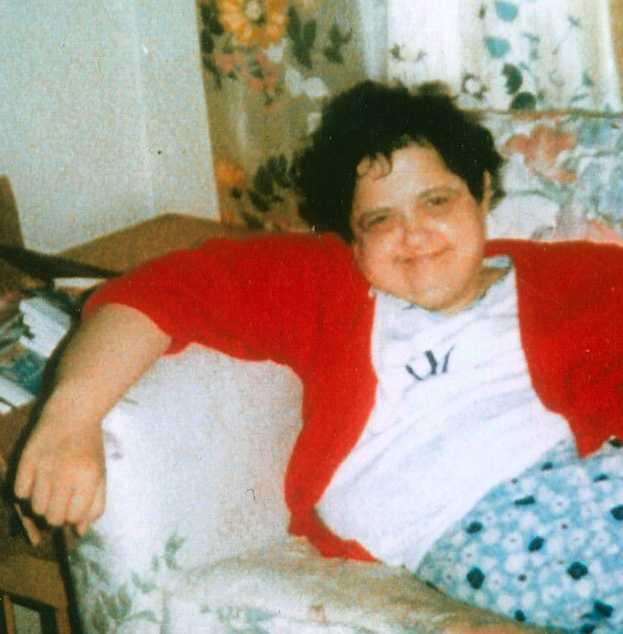

Eleanor J. Riese in her apartment in San Francisco circa 1989.
Eleanor died on April 6, 1991, at the age of 47. Prior to her passing, she was living in her own apartment in the San Francisco Mission District, supported by a loving sister. Her death was attributed to renal failure from the prolonged use of psychiatric drugs that caused repeated and painful urinary tract infections, leading to sepsis and death.
Photo: Colette Hughes
A Profile in Peer Advocacy
The Eleanor J. Riese Story
Eleanor Riese was a human rights pioneer. She fought for a patient’s right to know and be heard about forcible medical treatment with powerful psychiatric drugs.
Born and raised in San Francisco, Eleanor graduated from George Washington High School in 1960. She suffered from meningitis as a child and, during her early adult years, was diagnosed with schizophrenia.
In June 1985, Eleanor was admitted to the hospital as a voluntary mental health patient. There she began a persistent, legally significant fight for the basic right of informed consent and the right of competent adults, absent an emergency, to refuse psychiatric medication during short-term civil commitment. When Eleanor tried to exercise her right of informed consent and avoid adverse effects, she was forcibly injected and placed on a 14-day LPS (Lanterman-Petris-Short Act) hold.
Hospital staff attributed her dry mouth — so severe that she had difficulty speaking, dizziness, swollen feet, shaking, memory loss and increased seizures — to her psychiatric diagnosis and delusions, but Eleanor knew it was the drugs. She called the local patients’ rights office seeking legal representation. Jean Matulis, forensic appellate lawyer and former patients’ rights advocate, referred her to attorney and former MHCRA Program Director Colette Hughes, who then represented and advised Eleanor.
During this same hospitalization, Eleanor advocated to get others released from seclusion and restraint — a practice she abhorred — referring to the seclusion room as the “torture chamber.”
Throughout the years, Eleanor sponsored small gatherings of peers at her apartment to break bread, share their problems and seek solutions.
Because of her efforts, a Riese Hearing is now required to augment this protected right for all persons civilly detained on a short-term basis in California.
We owe Eleanor Riese great thanks, reverence and respect. She pushed against the system and insisted that her experiences, and the injustices she suffered, be made public and undeniable, essential elements in the ongoing struggle for bodily autonomy and control of our own lives.
More about the Riese Case
NEWS
NY Times Article US Court Rules Mental Patients May Reject Forced Drugging
MORE INFORMATION Disability Rights California

FILM “55 Steps,” a 2017 film starring Helena Bonham Carter as Eleanor Riese, Hilary Swank as attorney Colette Hughes, and Jeffrey Tambor as Professor Mort Cohen, details Eleanor’s courageous battle to confirm the basic patient right of informed consent to psychiatric drugs during short-term civil commitment, and Miss Riese’s experiences fighting to make lasting changes in California’s mental health law in the name of patients’ rights.
This independent feature film, directed by Billie August, was pre-released with standing ovations at the 2017 Toronto Film Festival, and released in the United States in 2018. It can be streamed for viewing on a number of platforms, is for sale and rental via DVD and is available at your local public library. The film is in more than 20 languages and has been shown in human rights venues internationally, including the Office of Civil Freedoms in Tajikistan.

Make an appointment with an advocate
Phone Office 415.552.8100 or toll-free 800.729.7727
Leave a message, and an advocate will get back to you within 24 hours.
Email admin@sfmhcra.org
Calendar Find a date and make an appointment with an advocate for a phone conversation or video chat.
